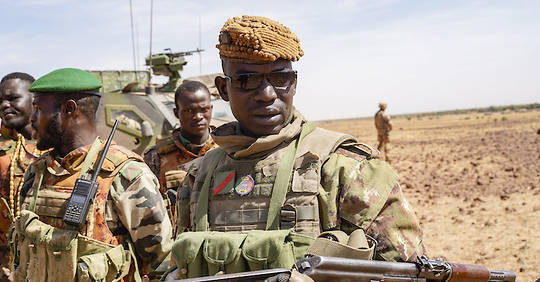LMalian soldiers dissatisfied with the new government announced by interim officials arrested the president and prime minister on Monday in a plot that rocked the country, which has been mired in years of deep crisis. The majority of the international community “strongly condemned the plot” and, in a statement, demanded the “immediate and unconditional release” of President Bah ந’u’llh and Prime Minister Mokhtar Owane, along with some collaborators who were persecuted by troops in the Katie Army camp, a few miles away from the Malian military machine, Bamako.
Elected President Ibrahim Bakr Gesta was forcibly led by coup d’etat on August 18, 2020 to announce his resignation. Nine months later the same kernels are moving. Their motives are unknown. The prime minister had earlier said he had been taken away by the military. “I assure you: the men of Costa took me to the President, who lives far from my home,” Mokhtar Owane said in a brief telephone conversation with AFP, referring to the strong Malian man, Colonel Azimi Costa, the current vice president of change. Then the conversation broke down.
The two leaders of the interim administration were later taken to the building, where a senior army officer confirmed their presence. Pamago was buzzing with rumors of a conspiracy that would be difficult to confirm, and international travels have issued warning messages. The capital, which experienced a fourth plot with Mali in August 2020 after independence, however, showed relatively normalcy on Monday evening.
The international community is protesting
The work of the United Nations in Mali, the Community of West African Nations (EGOs), the African Union, France, the United States, the United Kingdom, Germany and the European Union have stated in a joint statement. “Their firm support for the interim authorities.” They foresaw any false ally, including the forced resignation of the arrested leaders. ECOWAS mediator Goodluck Jonathan is announced in Bamako on Tuesday, and we learned from diplomatic sources.
These events came just hours after the announcement of a new government, still dominated by the military, but officials close to the military junta that seized power after the August 2020 coup, led by Azmi Costa. The colonel had established interim officers a few weeks later, including a president, Bah ஜனாதிபதி’u’ll –h – a retired soldier – and a civilian led by Moktar Owane. They promised to return power to the elected public after 18 months, without hesitation and under pressure from the international community, not for three years.
Read moreSerge Agus: “Africa has no specific treatment”
Faced with growing political and social opposition, the prime minister proposed the resignation of his government ten days earlier and was immediately re-appointed by interim President Enda with the aim of forming a founding committee. The place given to the military, especially those close to the former regime, is largely unknown, and in recent days there has been growing concern that the colonels are not satisfied with Mokhtar Owane’s choice.
In the government that announced the interim president, the soldiers still hold the ministries of defense, defense, regional administration and national reconciliation. But amid changes announced in a report read on public radio and television, two members of the former regime, Colonel Sadio Camara and Modibo Cohn, are leaving their respective defense and defense portfolios. They were replaced by General Solomon D’Core and General Mamatou Lamine Palo, respectively.
The new government welcomes – for education and land issues – two ministers who are members of the Union for Democracy and Democracy (URD), the main political force in the June 5 movement (M5) that led to the removal of the animated coalition president Gesta.
“Closed message”
“Through this reshuffle, the interim president and his prime minister wanted to send a definite message: it is a priority to respect the deadline for change,” a source close to the presidency told the unnamed AFP. According to this source, “a restructuring of the security and security levels is necessary”, the new posts are “not the identifying figures of the military junta”.
In mid-April, the interim authorities announced the organization on October 31 of a vote on the long-promised constitutional amendment and decided on the presidential and legislative elections for February-March 2022, by which time they would return to power. To public leaders. However, doubts remain about their ability to adhere to their agenda, and in an environment where jihadi and other violence continue unabated, political opposition is re-emerging and signs of social discontent are accumulating. Mali, a country of 19 million people, and its Nigerian and Burkina Faso neighbors are caught in a whirlwind of jihadi, inter-ethnic and other violence, which has killed thousands and displaced hundreds of thousands.

